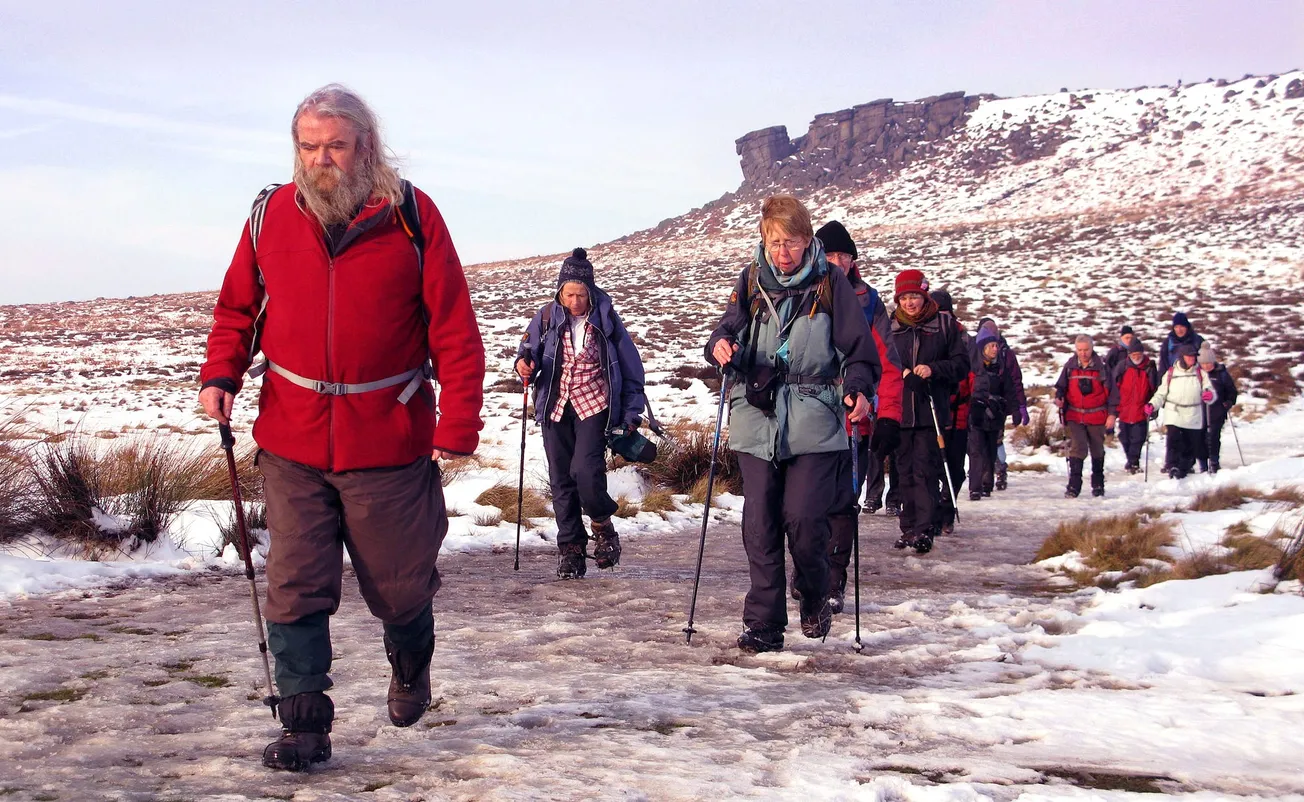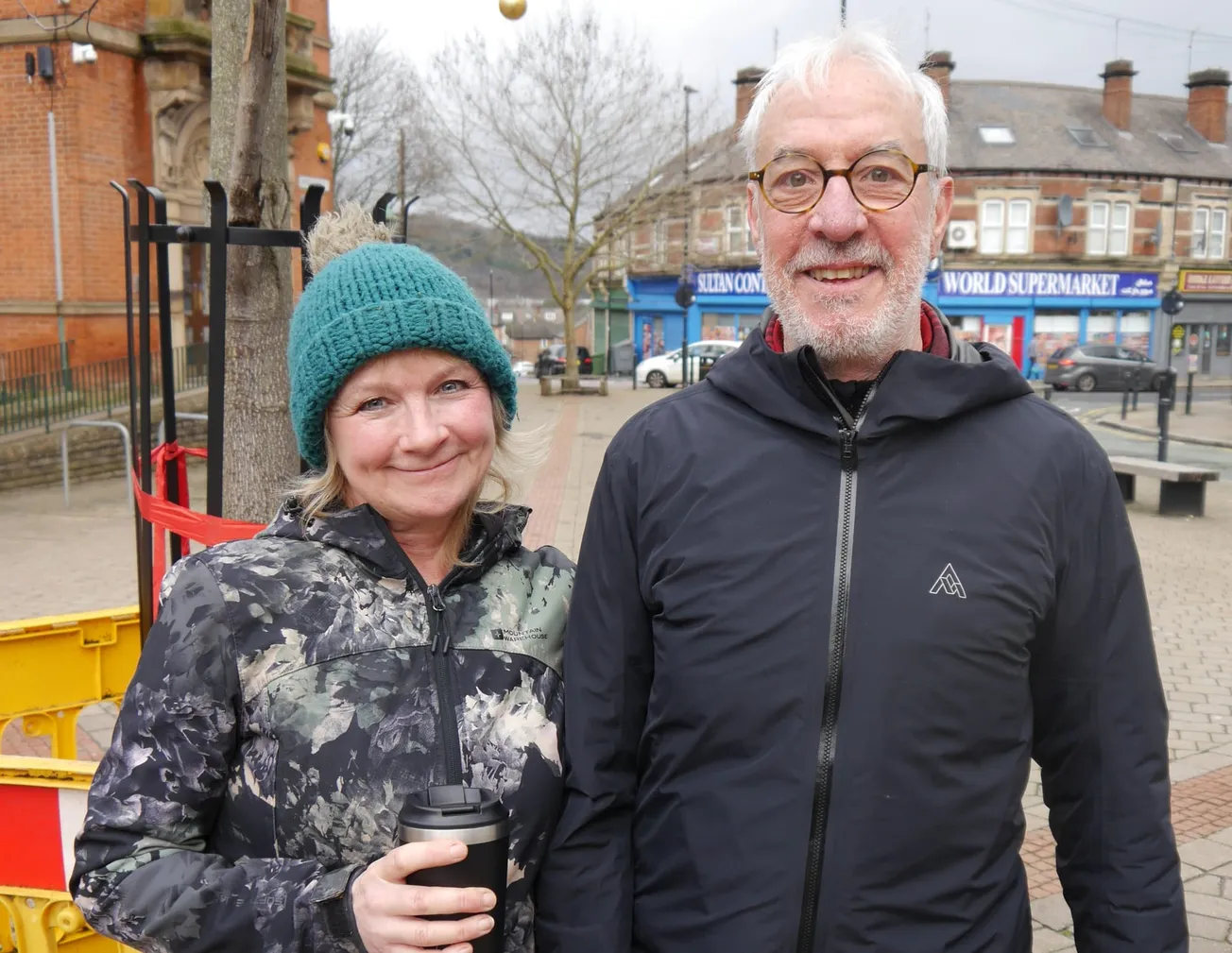Big, bearded and full of purpose, Terry Howard is straight out of England’s stories of hills and forests — like King Arthur, for example. It’s appropriate, given that his story is just as heroic as the matters concerning the Knights of the Round Table (if a little less concerned with battles and empire-building). He believes in the land, and our place in it, and has been fighting for well over 40 years so you and I might walk onto our moors and woodlands and riversides without fear of being chased off by private landowners and their staff.
About 25 years ago Terry burst out of the woods above Fairholmes, the tourist cafe above Ladybower Reservoir where I was visiting with my children. He’d spent the morning exploring along the Locker Brook stream on the hillside. He had the same Viking hair and beard he has now, just a bit darker, and the kids took a step back, suddenly shy.
“Look,” he said. “An arrowhead. Probably thousands of years old. Found it just up there,” he added, pointing vaguely uphill. “Right. I’ll let you get on.” And he was gone, disappearing back into the trees.
At this point, I’d already met Terry a few times. We’d crossed paths on stories about rambling in the local countryside, though more often thanks to the long campaign to gain access for ordinary people to the moorland owned by wealthy shooting estates to the north and west of Sheffield.

One of the founders of SCAM, the Sheffield Campaign for Access to Moorland, Terry and colleagues had become the primary irritant to a series of governments and landowners who’d kept the public off enclosed and private land guarded by gamekeepers and ‘Private! Trespassers Will Be Prosecuted!’ signs.
But soon after I met him and his arrowhead in the forests of Derwent, the signs came down and the stiles went up across much of the Peak District and many other moorlands, when access to most of the country’s moors and mountains was finally granted by the Blair government in the Countryside and Rights of Way (CROW) act of 2000.
Terry didn’t stop however: what about access to mature woodland, riverside and coastlines, he and his SCAM colleague Dave Sissons said to me after the act came about. “Many places in Europe do that, and Scotland too. Why not England?”
There’s an election looming again, and if you believe the polls, there are signs of a possible Labour party victory. (This week’s YouGov poll puts the Labour Party 19 points ahead of the Conservatives at 44%).

If you look back only a few years you’ll see how closely the access and labour movements in the twentieth century were tied. And during the debate on the Public Access to Nature private members bill tabled by Green MP Caroline Lucas this May, the shadow environment minister Alex Sobel said very clearly that public access to much more than mountains and moorland was on the Labour party’s agenda.
"Like in Scotland, Labour’s approach will be that our right to roam will offer access to high-quality green and blue spaces for the rest of Britain,” Alex Sobel said. “We will replace the default of exclusion with a default of access and ensure the restoration and protection of our natural environment.”
While researching more about Terry, I came across Ramble On, a short film about him which was directed by the London filmmaker Charlie Thorne. It was shown at the nationally prestigious Sheffield Documentary Film Festival this year and is now in the BFI archive. I’m intrigued as to how someone based so far outside of Sheffield stumbled across Terry’s activism — so I called Charlie to find out.
“I’d been developing a project about walking, and researching the right to roam, and I found a clip of Terry and heard his voice and it spellbound me,” he tells me. “It was like magic, like listening to a wizard recounting incredible details from his life.” Terry uses the word magic a lot, Charlie adds, unaware perhaps that it means something particular to Terry’s generation of Sheffielders. Awesome, perhaps, in a more modern vernacular.

But the Ramble On film is indeed, magic. After four hours of listening to Terry’s soft spoken wisdom in his Sheffield living room, Charlie, at 34 around half Terry’s age, followed him out for a couple of strolls around typical north west Sheffield woods and moorland, and the film is thirty minutes of Terry walking and talking about his relationship with the countryside and its long history.
The viewer watches him walking briskly through Greno Woods, looking around as he goes as if he’s never seen the place before. But this is where his dad, Thomas, took Terry and his brother John on a trip every Sunday from their council house in Parson Cross.
His dad said they were going to look for treasure, Terry says to me when I meet him at Weston Park. (We had a coffee and chat, but I could tell he was itching to get outside despite the drizzle.) “But to me it was about being out exploring and looking and discovering,” he explains. “It was a bit of an adventure.”
Adventures have always seemed to form part of Terry’s life. At the age of 15, the Woodcraft Folk arranged for him and over a dozen other Sheffield teenagers to meet some fellow outdoor-loving contemporaries in Norway. It was one of the main formative experiences in his life, he tells me.

He and his brother raised the money for the trip by chopping up sticks gathered from local woodland and selling them for fuel, and by a mice-breeding programme in the family shed. “We’d take a boxful of mice to sell to Maces pet shop in the market,” he said. “Whether it was ethical or not…” he tails off, raising a bushy eyebrow.
The teenagers were taken by lorry deep into the Norwegian forests, given a tent sheet and told to make their own tents and poles and tent pegs from whatever they could find. They spent a week, effectively wild camping with 30 other teenagers from urban Sheffield and Norway. “I remember it as if it were yesterday. It was absolutely magic.”
The next week he was assigned a family to stay with in Oslo. As it happened, his host was Einar Henry Gerhardsen, the Prime Minister of Norway at the time, whose son, Rune, was also about 15. Terry raises an eyebrow again. “A working-class kid from Sheffield living in the same house as the Prime Minister of Norway,” he says. “It made me realise in Norway they don’t have that hierarchy that we have here.”
On returning to Sheffield, life continued in rather less starry a fashion. Terry left school at 16 with O levels in woodwork and technical drawing, and spurned a job as a trainee salesman as “too boring.”

In his early 20s, he got a job for the public waterworks company in the Ewden Valley, where he became a dam keeper at the wild and stunning Broomhead Reservoir. “I had to walk round the reservoir every day to make sure everything was alright and no-one had chucked themselves in.” He kept looking and discovering, and found the reservoir scree was “teeming with stone age tools and arrowheads and scrapers.”
At the same time, he’d been ascending the ranks of the Woodcraft Folk, a left-leaning youth organisation launched as a less militaristic rival to the Scout movement in the 1920s, promoting peace, cooperation, respect for the environment and internationalism.
He became a member as a boy, and loved having the opportunity to spend so much time exploring the wilds with fellow children. Another key formative experience, he tells me.
Terry became a Woodcraft Folk adult leader in his twenties, and then an environmental studies teacher for a few years until such roles were dispatched from the teaching profession in the 1980s. His subsequent and long term job as a gardener gave him more time for the countryside, and teaching Woodcraft Folk children, and campaigning so they and other children would be able to access so much more of that countryside than he could as a boy.

But although the countryside may be more accessible now than in Terry’s childhood, there’s still a way to go. On chatting to Charlie earlier, he told me his own interest in the right to roam movement was sparked by lockdown walks near his family home in Sussex, where he noticed so much of the land was barred by ‘Private. No Entry’ signs.
Over the years Terry has told me of the same outrage felt by Sheffield ramblers like George Herbert Bridges Ward more than 100 years ago, who organised dozens of trespass walks over forbidden moorland, often at night when the gamekeepers were unlikely to be out and about, long before the famous one day Kinder Trespass in 1932.
SCAM used the ‘Right to Roam’ term many years ago when they organised regular newsworthy trespasses, while lobbying MPs and developing supporters. SCAM were simply following on and learning from all the campaigners who went before, says Terry. He supports the campaigning work of the modern Right to Roam movement, but wonders if they are also learning from their predecessors, or just doing their own thing. “For the future, you’ve got to build on the past,” Terry says.
Charlie seems more complimentary when it comes to the modern access campaigners behind the new incarnation of Right to Roam, like Nick Hayes and Guy Shrubsole, and said maybe their science and information-based approach is needed for a modern audience. He said he thinks SCAM probably did more than any other group to make the CROW act happen, but it took over 20 years. So maybe modern campaigners will need to learn the same persistence.

Charlie and Terry are both watching the politics develop over the next year, and both take the ‘I’ll believe it when I see it’ approach to shadow minister promises of access to woodlands, rivers, the edges of farmers’ fields and coastlines.
Hand in hand with the right to roam is the responsibility of respect for the countryside, and actually wanting to get out there in the first place. Terry tells me of a group of theoretically unteachable schoolgirls who spent a day with his Woodcraft team at the Lockerbrook Outdoor education centre he’d help set up in the Peak District years ago.
They repaired a stone wall in the pouring rain, and had a fantastic time, he says. He met one of them on a bus years later after she’d spent a day rambling in the countryside, and she told Terry the day had changed her life. How many other teenagers, who he’d never have a chance to meet, have the same story about the benefits of the outdoors, he wonders.
Terry is in his seventies now, and seems to me to walk in the quick and determined way he always has, although he admits he’s not so good at clambering over ‘keep out’ walls nowadays. On the day the CROW act finally came into force, he went to a notorious gate onto Bamford Moor, usually locked and festooned with barbed wire, where he says in the past if he’d clambered over, he’d spend his trespass time watching out for gamekeepers hiding behind trees.

On that day, he tells me, there was a stile. “So I climbed over and there was no need to look round. It was a feeling of utter freedom, to be up here, enjoying all this moorland,” he says. “And I thought of all those people who’d campaigned for this, for so long, but would never share in that day. And how lucky I was.”
He’s unsure what comes next, but I feel he’s still fairly hopeful. There’s no rowing back about moorland and mountain access now, and it seems to make no sense for Scotland to allow access to woodlands and rivers and coastlines, while England excludes us from such wild places. The argument has been won, perhaps, but we still need action rather than words, he says,
Terry takes me on a stroll through Weston Park, and canny teacher that he is, I know something unexpected is coming. He points to the Victorian eaves of Sheffield University where a bearded face is looking down through foliage intertwined with his moustache. “The Green Man,” he says.
An ancient symbol of natural renewal the wealthy Victorians still wanted, linking their educated scholars with the wild outdoors. And it looks just like Terry Howard.








